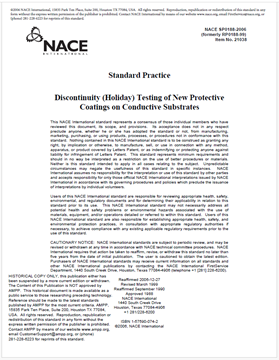This NACE standard recommended practice provides the current technology and industry practices for mitigating corrosion under thermal insulation and fireproofing materials, a problem termed corrosion under insulation (CUI) in this standard. Because this corrosion problem has many facets and impacts several technologies, a systems approach has been adopted. This standard is intended for use by corrosion-control personnel and others concerned with the corrosion under insulation and/or fireproofing of piping and other plant equipment. This will concern chiefly the chemical process, refining, and power generation industries.
This standard was prepared by NACE Work Group T-5A-30a on Corrosion Protection Under Insulation, with the assistance of Task Group T-6H-31 on Coatings for Carbon and Austenitic Stainless Steel Under Insulation and ASTM( 1l Committee C-16.40.3 on Corrosion Under Insulation. Work Group T-5A-30a supports NACE Task Group T-SA-30 on Corrosion Under Thermal Insulation, a component of NACE Unit Committee T-5A on Corrosion in Chemical Processes. This standard is issued by NACE Group Committee T-5 on Corrosion Problems in the Process Industries, the sponsor of T-5A. Task Group T-6H-31 supports NACE Unit Committee T-6H (Coating Materials for Atmospheric Service), a component of NACE Group Committee T-6 on Protective Coatings and Linings.
The work group has organized the standard into sections by function. Each section was written by specialists in that subject. These specialists are industry representatives from firms producing, specifying, designing, and using thermal insulation and fireproofing products on refinery and petrochemical equipment and piping.
1.1 Corrosion under insulation (CUI) has been occurring
for as long as hot or cold equipment has been insulated for thermal protection, conseNation, or process stabilization. The destructive results and nature of the corrosion mechanism are not referenced in the literature until the 1950s. As more problems have been experienced, concern and interest have built around this subject. Many articles and symposium papers have been published since 1983 as interest and activity in CUI have increased. The increased activity was driven largely by many occurrences of severe CUI resulting in major equipment outages, production losses, and unexpected maintenance costs in refineries, gas plants, and chemical plants.
1.2 To correct these problems, companies have developed their own criteria and approaches to the prevention of CUI. When comparing the various approaches, it is evident that there are many similarities, some differences, some new ideas, and some old ideas that have stood the test of performance. This standard incorporates the experience of many companies throughout the oil, gas, and chemical industries.
Historical Document 1998




